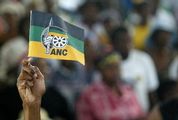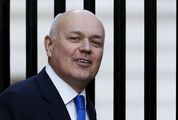COLIN Coleman is Goldman Sachs SA managing director.
BUSINESS DAY TV: The unseemly political tussle between various camps of government may mean a downgrade regardless, but SA’s business leaders are clearly rallying around Pravin Gordhan’s banner.
They say we have three months to save ourselves. One of them is Colin Coleman who is partner and MD of Goldman Sachs and he joins us now on News Leader.
Colin…there are a lot of concrete suggestions that are being lost in the noise that has erupted as a result of the political battles being waged around Pravin Gordhan, but in the statement that you with Christo Wiese and Cas Coovadia put out on Sunday, there were some very definite proposals. Perhaps you could talk us through some of the quick wins you think SA can score between now and June.
COLIN COLEMAN: Let me capture it…what we need to do is agree on a reform agenda and implement as Finance Minister Pravin Gordhan said yesterday, we actually have to implement and we’ll be measured in respect of that, this reform agenda. And certainly these are the suggestions we made on Sunday that we need to have two or three wins in the next few months such as on legislative impediments, the investors were quite focused on, the “once empowered, always empowered” legislation, they were quite focused on the visa requirements, they were quite focused on the Mineral & Petroleum Resources Development Act (MPRDA), for example…a lot of talk about the labour reforms, particularly the secret strike balloting, which we’ve talked about and as part of the labour negotiations is quite advanced actually but hasn’t yet been put into legislation. So hopefully that’s an area that we’ll get into legislation.
Also in respect of the labour reforms, there has obviously been a lot of talk about the minimum wage, but the minimum wage, the trade-off is between the positive effects of narrowing inequality as a consequence, but the negative effect would be if it’s set at too high a level, job displacements. So finding the right level, agreeing on that, but I don’t think we need to take forever to do that. We need to get on and decide, do we want a minimum wage? Yes or no, at what level and try and get that to some conclusion so that there is some certainty…that’s another area.
The question of Eskom and its funding model was raised quite significantly on the road show and that’s also because Eskom has trading bonds out in the market for which the bond investors want to see the balance sheet of Eskom strengthened. And there’s a common view out there that it could do with more equity and then a further question is, how are you going to get there?
So we were talking about whether it’s at a subsidiary level that you sell minority stakes so it can still operate as Eskom, it doesn’t really change the Eskom operating model. It just brings third-party equity into the equation…but you can bring significant equity in. Now whether that’s something Eskom wants to do or the National Treasury…is a different question. But they must make their decisions on that.
The same with other SOEs (state-owned enterprises), the finance minister talked in the budget about the merger of SAA (South African Airways) and SA Express and bringing in a minority equity partner. There is some scepticism out there about minority equity partners, but at the same time we all saw, or expressed views, that we want to bring private-sector participation in one or other form — operating, financing, technical expertise — into these enterprises, including board participation and that was a subject…we just want to see some progress in that respect and evidence that there is some progress…not necessarily that they have to do a transaction in the next 2-3 months but you want to see some concrete steps and evidence that it is happening.
So, those were some of the issues. It obviously was very good to have business, labour and government there. It really sent a strong signal to the investors and we were…there seems to be a new mood developing, in a way a “Prague Spring” of a new mood between the social partners and if that can be given some more stronger institutional form, that would be very positive.
BDTV: We know the pace of regulatory change in SA is quite slow. On June 3, Standard & Poor’s review committee will decide on whether our rating is going to change. What are the quick wins that we can gain, because lots of these things probably aren’t achievable by June?
CC: I believe making some definite decisions on those legislative issues and giving an indication on the state-owned enterprises will be two very practical steps. It’s up to the Cabinet to make its decisions in that regard, but investors need to hear specifics. As Pravin Gordhan said yesterday in his press conference, it’s not about announcing processes, it’s about announcing decisions.
BDTV: So do you think it is actually possible? Even though these things have been held up in legislative bottlenecks for years, it seems, do you think one can actually achieve what you’ve sketched out between now and June?
CC: Some of those issues can be achieved. I don’t see why you need to debate these forever in respect of certain of these issues. The minimum wage, the secret strike balloting, the “once empowered, always empowered” legislation…I know that’s caught up in due process and so on. But the government and business and labour can put their heads together and come out with agreements that can not necessarily even be definitive, but agreements on what do they want to do and put numbers and timeframes to it, I believe it will send a very strong signal.
BDTV: You talked about Cabinet decisions to push some of these things forward, but we don’t even have a cohesive Cabinet necessarily all on the same page and all with the same thinking as Pravin Gordhan. He has to win them over to his side as well at the same time.
CC: That’s why he is finance minister. He has been a political activist for a long time and people have a lot of confidence in him and his ability and by the way, the business-government interaction since the beginning of the year has been with the President and the Deputy President and Pravin Gordhan, and I was present at both the meetings with President Zuma and he is definitely very seized with this. But as I said, we need to get specific now.
BDTV: But what seems to have seized the markets now is division between governments…
CC: I think it’s really up to all South Africans to unite around a vision and certainly what we all want to see is all institutions of the state facing in the same direction and acting in the same direction. That’s beyond the ability of government…of business and labour to make happen…it’s got to happen within the government that that’s got to take place. But clearly the evidence of the road show as one example of government, business and labour, the rand last week was very stable. I know I looked at the rand when we started, at R15.38 and when we came back it was R15.38…there was a little bit of fluctuation in between, it was very stable.
But obviously events since have moved the rand a little weaker and to the extent that we have a stable, consistent message is going to help to stabilise sentiment out there. But clearly we are being buffeted by global winds as well as our local winds and we have to be cognisant of that.
BDTV: You’re part of a large US bank, what are your colleagues in America saying at this stage? Is SA still attractive to them or have they been put off by events of the past few months?
CC: It’s not just…Wall Street, institutions out there as a whole and what we heard from the institutional investors is that there is a lot of concern but at the same time a lot of goodwill. Nobody wishes SA badly at all and the institutions across the board were extremely constructive, very respectful and sometimes extremely direct and wanting SA to make some clear decisions and to face direction forward.
I’d also just say that the reality is for global institutions, the emerging markets as an asset class is under a lot of pressure, so it’s not just SA or Africa itself, Africa has a lot of indigestion with the commodity and oil prices feeding countries like Nigeria and Angola in very stressful ways. But you’ve got Brazil flat on its back, Russia facing a lot of difficulties, Turkey with its own problems.
So compared to what…SA is out there with a positive growth rate, we’re not in recession and there is a feeling that we can do a lot better. And obviously the strength of the business community is a big asset. The fact that we have a highly liquid capital market including a free-floating currency that’s highly liquid is very helpful…it acts as a shock absorber so we have this structural checks and balances in place and a very well run South African Reserve Bank and National Treasury. This is all extremely helpful.
BDTV: …let’s hope things work out as we wish them to!
























Login OR Join up TO COMMENT